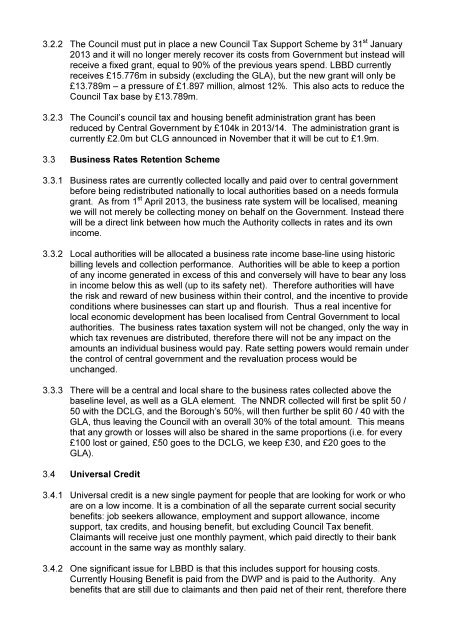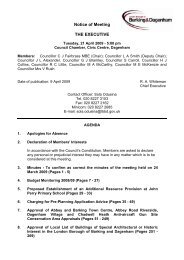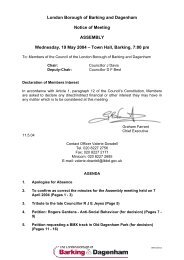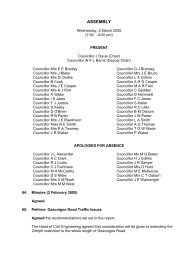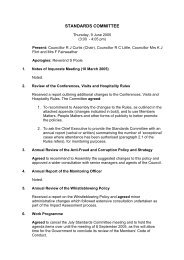Budget Strategy 2013-14 PDF 220 KB - London Borough of Barking ...
Budget Strategy 2013-14 PDF 220 KB - London Borough of Barking ...
Budget Strategy 2013-14 PDF 220 KB - London Borough of Barking ...
You also want an ePaper? Increase the reach of your titles
YUMPU automatically turns print PDFs into web optimized ePapers that Google loves.
3.2.2 The Council must put in place a new Council Tax Support Scheme by 31 st January<br />
<strong>2013</strong> and it will no longer merely recover its costs from Government but instead will<br />
receive a fixed grant, equal to 90% <strong>of</strong> the previous years spend. LBBD currently<br />
receives £15.776m in subsidy (excluding the GLA), but the new grant will only be<br />
£13.789m – a pressure <strong>of</strong> £1.897 million, almost 12%. This also acts to reduce the<br />
Council Tax base by £13.789m.<br />
3.2.3 The Council’s council tax and housing benefit administration grant has been<br />
reduced by Central Government by £104k in <strong>2013</strong>/<strong>14</strong>. The administration grant is<br />
currently £2.0m but CLG announced in November that it will be cut to £1.9m.<br />
3.3 Business Rates Retention Scheme<br />
3.3.1 Business rates are currently collected locally and paid over to central government<br />
before being redistributed nationally to local authorities based on a needs formula<br />
grant. As from 1 st April <strong>2013</strong>, the business rate system will be localised, meaning<br />
we will not merely be collecting money on behalf on the Government. Instead there<br />
will be a direct link between how much the Authority collects in rates and its own<br />
income.<br />
3.3.2 Local authorities will be allocated a business rate income base-line using historic<br />
billing levels and collection performance. Authorities will be able to keep a portion<br />
<strong>of</strong> any income generated in excess <strong>of</strong> this and conversely will have to bear any loss<br />
in income below this as well (up to its safety net). Therefore authorities will have<br />
the risk and reward <strong>of</strong> new business within their control, and the incentive to provide<br />
conditions where businesses can start up and flourish. Thus a real incentive for<br />
local economic development has been localised from Central Government to local<br />
authorities. The business rates taxation system will not be changed, only the way in<br />
which tax revenues are distributed, therefore there will not be any impact on the<br />
amounts an individual business would pay. Rate setting powers would remain under<br />
the control <strong>of</strong> central government and the revaluation process would be<br />
unchanged.<br />
3.3.3 There will be a central and local share to the business rates collected above the<br />
baseline level, as well as a GLA element. The NNDR collected will first be split 50 /<br />
50 with the DCLG, and the <strong>Borough</strong>’s 50%, will then further be split 60 / 40 with the<br />
GLA, thus leaving the Council with an overall 30% <strong>of</strong> the total amount. This means<br />
that any growth or losses will also be shared in the same proportions (i.e. for every<br />
£100 lost or gained, £50 goes to the DCLG, we keep £30, and £20 goes to the<br />
GLA).<br />
3.4 Universal Credit<br />
3.4.1 Universal credit is a new single payment for people that are looking for work or who<br />
are on a low income. It is a combination <strong>of</strong> all the separate current social security<br />
benefits: job seekers allowance, employment and support allowance, income<br />
support, tax credits, and housing benefit, but excluding Council Tax benefit.<br />
Claimants will receive just one monthly payment, which paid directly to their bank<br />
account in the same way as monthly salary.<br />
3.4.2 One significant issue for LBBD is that this includes support for housing costs.<br />
Currently Housing Benefit is paid from the DWP and is paid to the Authority. Any<br />
benefits that are still due to claimants and then paid net <strong>of</strong> their rent, therefore there


